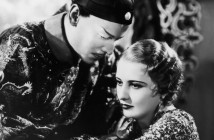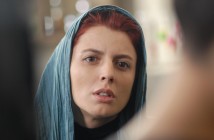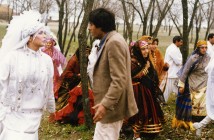
Editor’s Notes: The following article is part of our coverage for TIFF’s From Within: The Films of David Cronenberg which runs from November 1st to January 19th at TIFF Bell Lightbox. For more information on upcoming TIFF film series visit http://tiff.net and follow TIFF on Twitter at @TIFF_NET.
The TIFF Bell Lightbox has a David Cronenberg retrospective going on this month. There’s an exhibit, films, and events. Some of these include introductions to films by actors, producers, screenwriters, or directors. For their screening of Dead Ringers, I sat in on a small Q and A with both David Cronenberg and Jeremy Irons. Piers Handling, Director and Chief Executive Officer moderated this great discussion.
—-
Piers Handling: We opened the festival with Dead Ringers. It was remarkable. It was one of the more controversial opening films we’ve had and it’s one of the ones I’m the proudest of.
David Cronenberg: It was a shocking film to open a festival. I don’t know if you’ll feel that way when you see it now. There were many actors who read the script that I wrote with my colleague Norman Snider. It’s based on a real story: a pair of New York twins, but very fictionalized nonetheless. Many actors were terrified of this role and refused to do it. Jeremy was the first one who said, “I might.”
I was so grateful. I think I burst into tears when I heard that because I really thought there was no viable actor that could play this role; especially with the twinning affect. You’d think that most actors would just die to play twins! But no, they were terrified because these twins weren’t the good twin and the evil twin and you could really tell the difference. These were two real human beings and therefore not easily characterized. It was a very subtle and difficult role to play. Jeremy is absolutely brilliant in it.
It took about ten to twelve years to get it made. It took me about eight years to get Map to the Stars made which I’m editing now.
Piers Handling: Why the fascination with gynecology and gynecologists?
David Cronenberg: We did try to set this up in several studios to the producers who first worked on it. The line that was given could have come out of a Hollywood satire: “Yeah, but do they have to be gynecologists? Couldn’t they be lawyers?”
I said, “That’s better?”
Yes it has to happen that way and yes, they have to be gynecologists.
First of all, the actual twins were the New York Marcus twins and they were gynecologists. And their story had very much to do with women’s bodies and sexuality, and the power they had with it. It wasn’t so clear then politically in terms of feminism when we were doing it then, but it’s crystal clear now. That’s why it had to be gynecology.
Piers Handling: You came off two very major films then, The Fly and Dead Zone, so you were making films within the studio system. This feels like it was such an incredibly personal project. It’s almost like a turning point in your career. It’s a deeply personal, dark film, and everything after it is just as personal and uncompromising.
David Cronenberg: I think that’s true. I think it was a step up in genuine quality. It’s the first picture Peter Suschitzky and worked on. He shot the Empire Strikes Back as well as The Rocky Horror Picture Show, and he’s been my director of photography ever since.
Piers Handling: Jeremy, how did you prepare for this role?

Jeremy Irons: We started off doing very actor-y things. We had a separate dressing room for both of the twins. I went shopping on separate days for their costumes. Then about the third day we started seeing rushes and I looked, and I said, “David this is a disaster. You can obviously tell the difference between those two. They’re completely different!” So I didn’t think that was going to work.
So we knocked down one of the dressing rooms in the studio and I mixed up all their clothes. I think the one difference is that I wear one ring on my pinky for one and not for the other which was useful to remind me who I was. But basically I found it an energy thing inside which was useful for those of us who study this medium. I put my energy for Elliot here, which is where you head butt people. And I put my energy for energy for Beverly here, which is where you’re strangled; it’s a very vulnerable place because I thought he was a vulnerable man.
So I could just switch. It changed the way they spoke and the way they stood; it changed everything of their interior energy.
Audience member: How was it working with Cronenberg and what did you think of it after reading the script?
Jeremy Irons: Working with David was a complete delight. He is a very intelligent and a very interesting man. He drives interesting cars which is why you look forward to the end of the day when you get a lift from him. But he was generous enough to make me feel like I was a collaborator in the telling of the three of us, really, it was Peter, David, and I. Even though I wasn’t he really made me feel like I was an equal collaborator. It’s always good when someone makes you feel that way.
Piers Handling: How does he do that?
Jeremy Irons: I don’t know really. I guess that’s one of the reasons he’s a good director. I mean, there are many sorts of directors. I always thought my perfect director is like a great chef. The he chose the ingredients, the cast for the movie. He knows his recipe, that’s the script. He then puts things together and hopes they begin to cook. He puts in a bit of pepper in a few things and stirs the pot a bit. Basically, he’s allowing it all to happen by allowing all the ingredients to cook together. Not just the actors, but also the art direction, the cameras, the sound, and all of that. And he sort of watches. At the end he tastes it to find out what he’s got.
David once said to me, “I can’t wait until Dead Ringers opens so critics can tell me what it’s about.” That’s a very humble thing to see. He allows things to happen. He casts as well as he can and scripts as well as he can. Then he sees what happens.
Piers Handling: Did you talk about it a lot beforehand or did he give you the freedom to find the character by yourself?
Jeremy Irons: In truth, I can’t remember. Actors always believe that they create entirely by themselves and they forget they have people who say, “Don’t do that.”
I’m not a great one for talking. I think something is normally clear in a good script. You don’t need much talking beyond that. If you need a lot of talking, there’s something wrong; either your acting is wrong, or your idea as a director is wrong. With a good director, good casting, and a good script, it’s sort of there. Talking and over-intellectualizing things is not something I’m keen on doing.
You act really from the gut and your feelings.
Piers Handling: Were you watching dailies every day then to shape your performance?
Jeremy Irons: Yes, although I don’t really believe in shaping your performance. I love the way people are so inconsistent and so unshaped in reality. I often think that in drama we tend to over-shape and we tend to make things over-logical. Shakespeare taught me; that we are totally inconsistent. If you embrace those inconsistencies, you will begin to get a character that will seem a bit real.
Obviously, if you know the script, you will know the arc. You know where he’s going to start off, where he goes through, and where he finishes. But there’s bits on those journeys you don’t really know them until you do them and you carry a scene as far as one can.
Piers Handling: Are there things or those inconsistencies that you notice after seeing the film tonight?
Jeremy Irons: It’s very hard for me to comment on it really. Somebody said to me very recently, “I will never forget that scene in Dead Ringers where you wander around saying,’Elli. Elli. Elli.’ And was that written?”
I don’t know if that was written. I don’t think that I’ve still got a script. I think the feeling was probably right. I can’t describe what that feeling was.
—
Cronenberg and Irons are both very passionate about their work and it came across transparently in their talk of Dead Ringers. While the film can be seen is a true example of Cronenberg’s ability at subtle emotional impingement on his audiences, it’s also one of the first films critics mention when describing Jeremy Iron’s genius at character portrayal. Cronenberg can set up veracity in the fantastical, while Irons will inhabit it like a manipulative puppet master.



